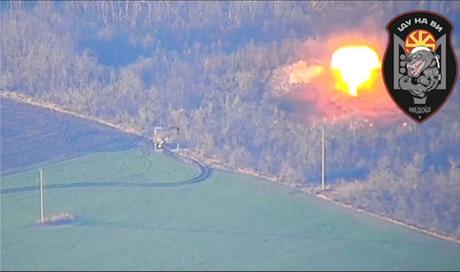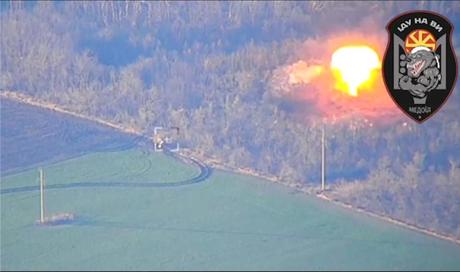-
Russia is trying to cut off Ukraine's access to Elon Musk's Starlink satellites, analysts say.
-
That hasn't happened, despite the development of a growing arsenal of electronic warfare systems, they said.
Satellites have proven crucial in military operations and for communications between Ukrainian forces.
Russia is trying to cut off Ukraine's access to Elon Musk's Starlink satellites, according to space war analysts.
Since the start of the war, Russia has used jamming systems to deny Ukrainian forces access to commercial satellites.
It has jammers attached to his tanks to disrupt satellite signals and disrupt exploding drones, has blocked Ukraine's GPS-guided bombsAnd stalled Ukrainian dronesforcing Ukrainian operators to do so come closer to their targets on the front lines.
Access to satellites has played a crucial role in Ukraine's defense against Russia. specifically, access to Musk's satellite network.
Satellite internet kept Ukrainians online and their businesses running during the war. It has also made it easier for soldiers to communicate on the front lines and for weapons systems and drones to continue functioning.
At the same time, Russia has gotten better and better at jamming disrupting Ukraine's most advanced weaponshinder Ukraine's combat capability.
However, Russian efforts to cut off Ukraine's access to Starlink satellites have so far failed, space warfare analysts say.
Jam-proof signals
"Russia would absolutely love to find a way to nullify Ukraine's use of Starlink," said Brian Weeden, chief program officer of the nonprofit Secure World Foundation.
"But that's much easier said than done because of the architecture of the constellation," Weeden told Business Insider.
Starlink's signals are stronger and more concentrated because the satellites operate at a significantly lower altitude (about 540 miles) than conventional geostationary communications satellites (about 35,000 miles). according to Starlink's website.
The story continues
Because Starlink satellites are closer to Earth, latency (the delay between a user's action and a response on the network) is shorter. This speeds up streaming, online gaming, video conferencing and other activities on the Internet.


In the context of electronic warfare, this makes Starlink's signals much harder to disrupt, Weeden said. As a result, Russian hackers have never managed to hack Starlink until now, he added.
While there is "very little" open data to investigate Russia's electronic warfare attacks on Starlink, he said it does not appear that Russian efforts have had much success so far.
Kari Bingen, director of the Aerospace Security Project and senior fellow at the International Security Program at the Center for Strategic and International Studies (CSIS), made a similar point.
"They keep trying, but they don't seem very successful," Bingen told BI.
She said Starlink satellites are both "resilient" and "agile," with Starlink operators constantly updating their software to withstand Russian attacks.
Russia has hit satellites several times since the invasion of Ukraine
According to the Counterspace timeline Through CSIS's Aerospace Security Project, Russia has attempted to access, target, or infiltrate U.S. and foreign satellite networks several times since the invasion of Ukraine.
On the day of the Russian invasion of Ukraine on February 24, 2022, Russian hackers arrived launched a cyber weapon against Viasat, an American satellite communications provider that provides military communications services to Ukraine.
The attack hit a large number of satellite communications stations and affected hundreds of thousands of people in Ukraine and Europe.
According to a research Following the US cyber attack, Russia launched cyber attacks on commercial satellite communications networks to disrupt Ukrainian command and control during the invasion of Ukraine.
In March 2022, Finnair, Finland's largest airline, reported several cases of GPS interference as its commercial aircraft approached Kaliningrad, Russia. according to Reuters.
At the time, so was Finnish President Sauli Niinisto meeting with US President Joe Biden to discuss strengthening defense ties between Finland and NATO in response to Russia's invasion of Ukraine.
SpaceX, the company that owns Starlink, was also attacked in April 2022.
The engineers combated Russian jamming attacks by updating the system's software, an unnamed Pentagon official said told BI at the time.
In a message on X a month after the attack, Elon Musk said Starlink "has so far resisted Russian cyberwarfare jamming and hacking attempts."
However, he also said that Russian hackers were "increasing their efforts."
To date, no other Russian jamming or hacking attacks against Starlink have been reported or made public.
SpaceX declined to provide BI with updates on Russia's attempts to jam or hack its Starlink satellites.
Russia's growing arsenal of electronic warfare systems
Russia has developed an arsenal of electronic warfare systems aimed at jamming communications satellites, according to Space Watch Global.
These are R-330Zh Zhitel, a mobile jamming communications station on a truck, and Bylina-MM, a system designed to suppress communications satellites, the magazine reported.
They have antennas mounted on trucks or vehicles that send out a powerful signal to try to saturate all receivers tuned to Starlink frequencies.
Another example is the Krasukha-4 mobile EW system, which can counter Airborne Early Warning and Control Systems (AWACS) and other airborne radars within an effective range of about 300 kilometers, according to the journal Airborne Early Warning and Control Systems (AWACS).
This is evident from a leaked American secret intelligence document obtained by The Washington Post in 2023 Russia has also been testing its Tobol electronic warfare systems for several months, hoping to jam Starlink's signals.
Russia also has a wide range of counter-space weapons, such as direct-ascent anti-satellite missiles (ASAT) and powerful lasers that can physically destroy satellites in orbit.
Ukraine strikes back
Ukraine has targeted them.
In July, Ukraine's special forces appeared to destroy a Tirada and an electronic "Learn-2" system using drones. video divided by the command of the armed forces.
Last November, the Ukrainian military reported that it had destroyed several Russian systems, including one Pole-21"Electronic Warfare System and a Svet-KU.
As recently as January, the same special forces said they helped destroy a Russian Tirada-2, a portable radio-electronic suppression system designed to disrupt communications satellites and which jammed satellite communications in eastern Ukraine.


Bingen said it is not "surprising" that Ukrainian forces want to remove these jammers from the battlefield because they degrade drones and precision munitions.
"This genre, this area of electronic warfare, is only going to increase," Bingen said.
Read the original article on Business Insider
